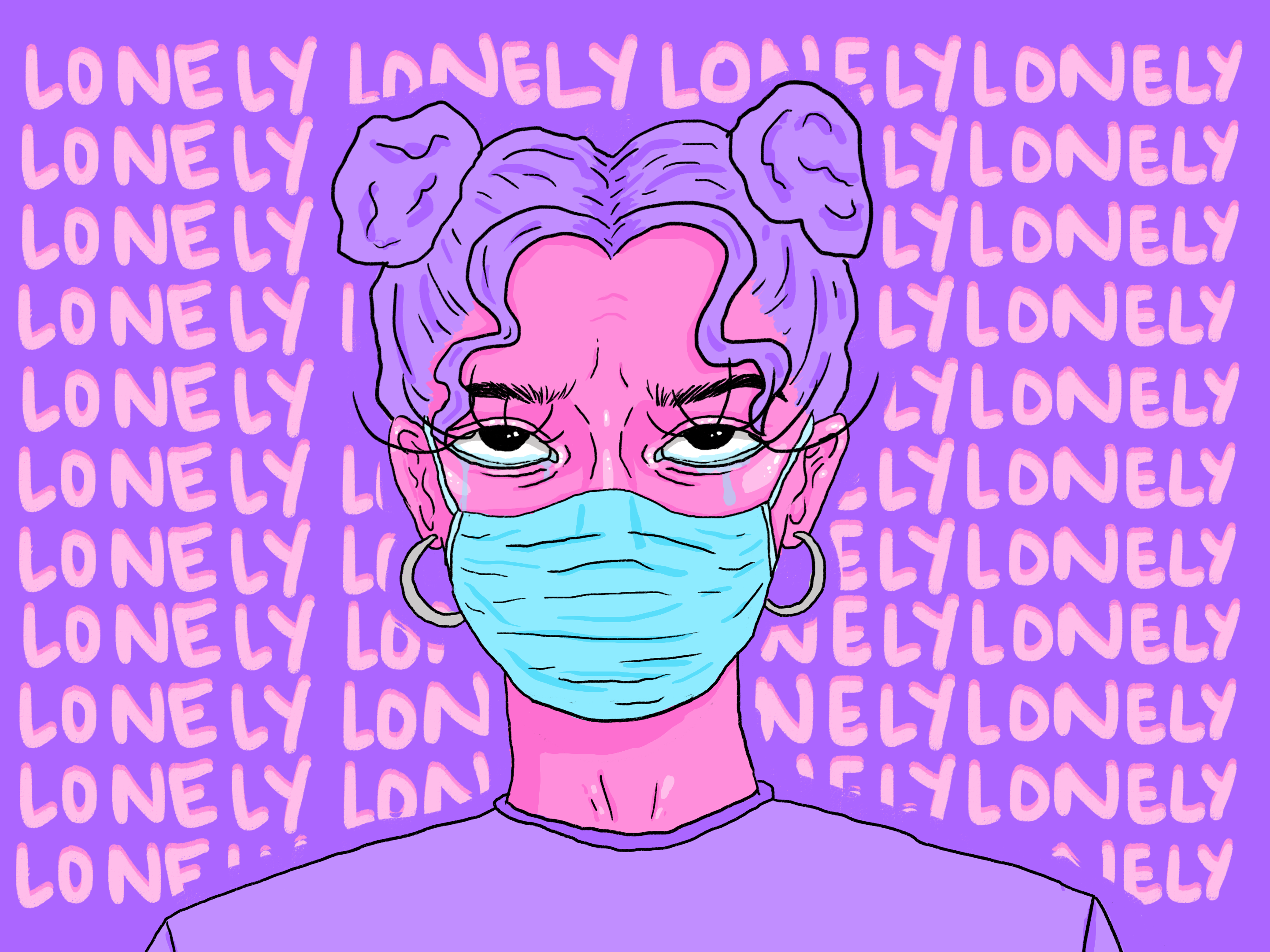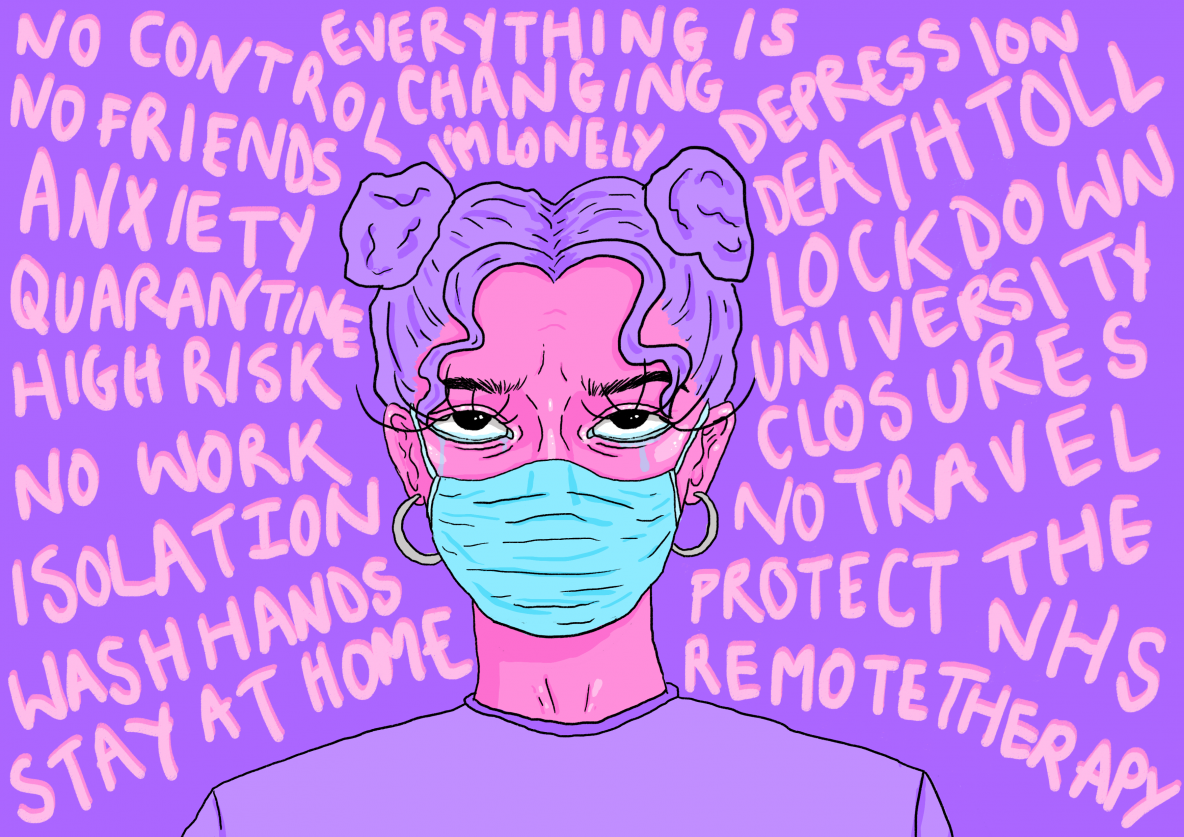LONELINESS IN LOCKDOWN
You are not alone
By Milla Alexander / 2 April 2020

Illustration by Jade Pughe
Whether or not you're stuck in the house by yourself during this lockdown, you might be feeling lonely.
No matter your circumstances - physically, mentally, emotionally - being confined to your house and social distancing could impact the mind in ways you might not expect. Loneliness has the potential to overwhelm anyone. Like a pandemic, it can spread rapidly, without the need for a host. But while there is no way of minimising its contagion, what you can, and must do is take comfort in the knowledge that you're not the only one infected.
The dictionary definition of loneliness doesn't quite explain all the disquiet a person can go through while feeling lonely. 'Having no friends or no one to talk to' doesn't quite clarify the meaning.
Loneliness, like a cancer, will metastasise and slowly weaken and shut down your organs. Each day you're consumed further, your resolve fades. Fighting it becomes harder and at some point, the will to want to try diminishes. Though loneliness might not kill you physically, it can annihilate your spirit.
Whether it creeps up on you slowly and silently and seeps into your consciousness without you realising it at all, or engulfs you all at once like a tidal wave, loneliness holds all the power and doesn't discriminate.
Everyone is susceptible to loneliness. While the world is getting smaller, more populated, and better connected, loneliness is actually on the increase. There are many factors that contribute to feelings of loneliness such as physical isolation, moving to a new location, and divorce. The death of someone significant in a person's life can also lead to feelings of loneliness. It can also be a symptom of a psychological disorder such as depression. Even internal factors such as low self-esteem can lead to loneliness.
While we self-isolate and social distance, unclear on how long this lockdown may last, it's likely that feelings of loneliness may permeate our psyche. Feeling that we've lost control of our lives, being unable to work or attend our place of education, or even losing our jobs, can lead to anxiety and the questioning of our self-worth.
Looking out for signs, while difficult, can help ease or stop an invasion in its tracks. Not doing so puts you at risk because loneliness has a variety of effects on physical and mental health. From cardiovascular disease and depression to increased stress levels and alcoholism, ignoring indicators could lead to a lifetime of other health complications.
So what is the cure?
Unfortunately, although scientists are working on it, there are no pills available to eliminate or heal loneliness. The best we can do is learn to spot and cope with it. There is no one thing we can do to prevent or protect. But like job instability, fears over the future of finances, and concern for family's wellbeing, one thing we can seek solace in right now is that we are not alone in our loneliness.
You can also try some of these coping mechanisms while in lockdown:
Strengthen existing relationships
Maybe you have people in your life that you could get to know better. Or perhaps connections with family could be nurtured further. Sharing how you are feeling is a great way to deepen relationships, and you just might find that you both share similar feelings. While you have to social distance, consider connecting with friends via video chats or Skype calls.
Find online support
Loneliness affects people all over the world. And because of that, many of them are looking for others to connect with. It's important to be safe and vigilant when communicating with strangers online, but there are plenty of sites you can visit when you're looking for support.
Practice positive self-talk
When loneliness takes hold, it breeds negative self-talk, from telling yourself that you're not worthy of friendships to blaming yourself for being 'unlovable'.
Make an effort to catch these thoughts and replace them with a positive message instead. It's not easy and takes time and practice, but it is a great way to help feelings of loneliness subside. If you're able to invest in online therapy, you'll learn all about these positive self-talk techniques. It's a good way to combat negative feelings, and it can significantly improve many areas of your life if you need help finding support, head here.
Take stock of connections you already have
We all tend to lose sight of what's right in front of us when we're feeling lonely. It's common to discount loved ones when we feel so isolated. If you find yourself noticing who isn't 'liking' your social posts or doesn't respond to your messages instantly (specifically while on lockdown), try expanding on how you define love and affection to include a wider range of behaviours, you may discover there is a lot you've missed.
Reconnect with self-love and appreciation
Although you go straight to self-loathing when you're feeling lonely, alone time can actually be an opportunity to reconnect with yourself. Meditation can help you become comfortable in your alone time. Remember that meditation can look different for everyone. For some different examples, head here.
Check your social media usage
You may be drawn to social media during self-isolation and social distancing, but it's important to consider the influence it has on your life. There is research to suggest that social media can negatively affect your mental health, so try scheduling social media' breaks' throughout your day, and use that time to do something in real-time. Apps like Flora can help you reduce your screen and social media time.
Volunteer
Switching your attention to how you can help others can go a long way to make you feel less lonely. There are many ways we can volunteer - particularly during this pandemic. But if you're having to self-isolate, or are unable to offer yourself physically, there are plenty of ways to volunteer remotely too. Try your best to find ways to connect with others when volunteering remotely. Working on an important problem with others can help you decrease loneliness.
Art by
Words by
Share this article

